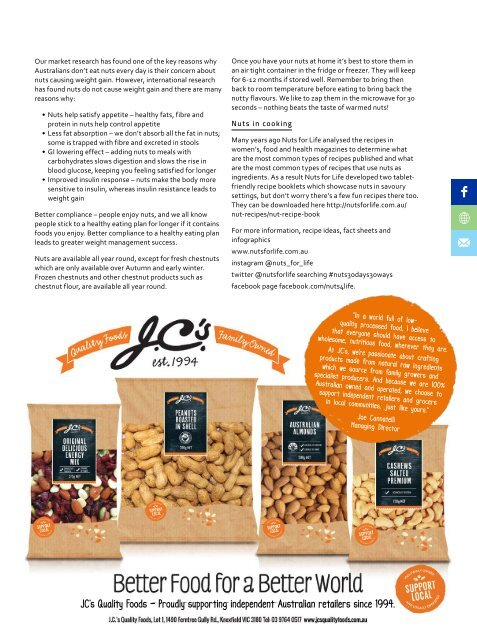Buy Australian Magazine June 2016
Create successful ePaper yourself
Turn your PDF publications into a flip-book with our unique Google optimized e-Paper software.
Our market research has found one of the key reasons why<br />
<strong>Australian</strong>s don’t eat nuts every day is their concern about<br />
nuts causing weight gain. However, international research<br />
has found nuts do not cause weight gain and there are many<br />
reasons why:<br />
• Nuts help satisfy appetite – healthy fats, fibre and<br />
protein in nuts help control appetite<br />
• Less fat absorption – we don’t absorb all the fat in nuts;<br />
some is trapped with fibre and excreted in stools<br />
• GI lowering effect – adding nuts to meals with<br />
carbohydrates slows digestion and slows the rise in<br />
blood glucose, keeping you feeling satisfied for longer<br />
• Improved insulin response – nuts make the body more<br />
sensitive to insulin, whereas insulin resistance leads to<br />
weight gain<br />
Better compliance – people enjoy nuts, and we all know<br />
people stick to a healthy eating plan for longer if it contains<br />
foods you enjoy. Better compliance to a healthy eating plan<br />
leads to greater weight management success.<br />
Nuts are available all year round, except for fresh chestnuts<br />
which are only available over Autumn and early winter.<br />
Frozen chestnuts and other chestnut products such as<br />
chestnut flour, are available all year round.<br />
Once you have your nuts at home it’s best to store them in<br />
an air tight container in the fridge or freezer. They will keep<br />
for 6-12 months if stored well. Remember to bring then<br />
back to room temperature before eating to bring back the<br />
nutty flavours. We like to zap them in the microwave for 30<br />
seconds – nothing beats the taste of warmed nuts!<br />
Nuts in cooking<br />
Many years ago Nuts for Life analysed the recipes in<br />
women’s, food and health magazines to determine what<br />
are the most common types of recipes published and what<br />
are the most common types of recipes that use nuts as<br />
ingredients. As a result Nuts for Life developed two tabletfriendly<br />
recipe booklets which showcase nuts in savoury<br />
settings, but don’t worry there’s a few fun recipes there too.<br />
They can be downloaded here http://nutsforlife.com.au/<br />
nut-recipes/nut-recipe-book<br />
For more information, recipe ideas, fact sheets and<br />
infographics<br />
www.nutsforlife.com.au<br />
instagram @nuts_for_life<br />
twitter @nutsforlife searching #nuts30days30ways<br />
facebook page facebook.com/nuts4life.<br />
“In a world full of lowquality<br />
processed food, I believe<br />
that everyone should have access to<br />
wholesome, nutritious food, wherever they are.<br />
At JC’s, we’re passionate about crafting<br />
products made from natural raw ingredients<br />
which we source from family growers and<br />
specialist producers. And because we are 100%<br />
<strong>Australian</strong> owned and operated, we choose to<br />
support independent retailers and grocers<br />
in local communities, just like yours.”<br />
Joe Cannatelli<br />
Managing Director<br />
JC’s Quality Foods – Proudly supporting independent <strong>Australian</strong> retailers since 1994.


